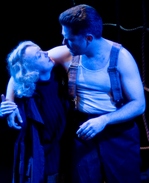SITE GUIDE
SEARCH
REVIEWS
REVIEW ARCHIVES
ADVERTISING AT CURTAINUP
FEATURES
NEWS
Etcetera and
Short Term Listings
LISTINGS
Broadway
Off-Broadway
NYC Restaurants
BOOKS and CDs
OTHER PLACES
Berkshires
London
California
New Jersey
Philadelphia
Elsewhere
QUOTES
TKTS
PLAYWRIGHTS' ALBUMS
LETTERS TO EDITOR
FILM
LINKS
MISCELLANEOUS
Free Updates
Masthead
A CurtainUp Review
Anna Christie
|
And now it's men all the time. Gawd, I hate 'em all, every
mother's son of 'em! Don't you?.—/Anna
|

Jenne Vath as Anna and Roger Clark as Mat
(Photo by Oded Weiss) |
The play begins when Anna, sick and friendless, seeks refuge with her father, who is now captain of a coal barge that never leaves port. Through a happy set of circumstances, Anna falls in love with a coal stoker her father rescues from drowning. After overcoming numerous difficulties, including her father's initial opposition and the revealing of her own shady past, the two decide to marry and, presumably, live happily ever after.
Anna Christie is a surprising play for several reasons. Unlike most of O'Neill's work, it ends happily. And unlike most melodramas of its era, it is both respected and frequently performed today.
What is it that makes Anna Christie so enduring? Most probably a combination of O'Neill's gift for creating believable characters and making poetry flow from their lips so naturally the audience forgets these are the words of a skilled artist.
Metropolitan Playhouse's staging, directed by Robert Z. Kalfin, is a simple, low-cost production. It actually benefits from the small stage. The intimate theater effectively illustrates the confined world in which Anna lives. But the real pillar of this production is Sam Tsoutsouvas, a fine actor whose portrayal of Anna's father, the crusty captain, Chris Christopherson, is nothing short of perfection.
It was O'Neill's great genius that allowed him to turn a man who took little interest in his wife and less in his daughter, into a gentle hero — a man who has been misled but never wanted to hurt anyone or do evil. It is Tsoutsouvas's great talent that allows him to breathe life into that character. He looks, sounds and moves so much like the captain one can almost smell the salt water inside the theater.
Roger Clark is also outstanding as the handsome, passionate, pious and somewhat hypocritical Mat Burke, who finds himself bound to Anna in spite of her past. This is no small accomplishment, considering how outdated the character is in our much more permissive times.
Jenne Vath completes the triangle with her restrained portrayal of Anna, a woman who is down but not yet out. Anna can chug her liquor but still clings to her dignity. She knows she's damaged goods, but despite the fate that most probably awaits her, she refuses to give up. Vath effortlessly conveys both the hope and the despair.
Paul Hudson's subdued lighting and Michael Anania's rustic set, with ropes suspended from above being the principal indication of the sea and the ship, keep O'Neill's universal themes of love and hope firmly anchored in time and place.
Kalfin has wisely given himself modest goals. He has not sought to reinterpret O'Neill, add unnecessary bells and whistles or give the play a modern context. He has instead trusted that his audience will be able to accept the play on its own terms and because of the strength of O'Neill's splendid gift for dialogue. His instincts have proved correct.
|
Anna Christie By Eugene O'Neill Directed by Robert Z. Kalfin Cast: Joe Atack (Johnny-the-Priest), Rob Sulaver (1st Longshoreman), Nick Delany (2nd Longshoreman), Zachary Spicer (Larry), Ian Campbell Dunn (Postman), Sam Tsoutsouvas (Chris Christopherson), Karen Christie-Ward (Marthy Owen), Jenne Vath (Anna Christie), Roger Clark (Mat Burke) Set Design: Michael Anania Costume Design: Rebecca J. Bernstein Lighting Design: Paul Hudson Composer/Sound Design: Margaret Pine Running time: 2 hours, 30 minutes with one intermission Metropolitan Playhouse, 220 East 4th Street From 11/14/08; opening 11/21/08; closing 12/14/08. Thursdays through Saturdays at 8pm; Saturdays and Sundays at 3pm. Sundays (11/30 and 12/7) at 7:30 pm. Tickets are $20 for general admission, $15 for seniors and preview performances, $12 Students, $10 for Children under 18. Call 212-352-3101 or visit www.metropolitanplayhouse.org to purchase tickets. Reviewed by Paulanne Simmons Nov. 22, 2008 |
|
REVIEW FEEDBACK Highlight one of the responses below and click "copy" or"CTRL+C"
Paste the highlighted text into the subject line (CTRL+ V): Feel free to add detailed comments in the body of the email. |






